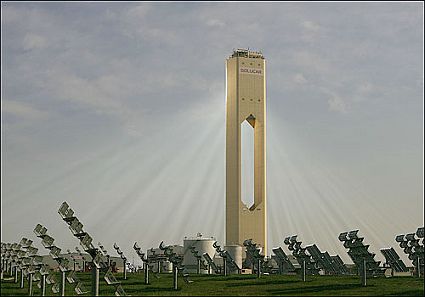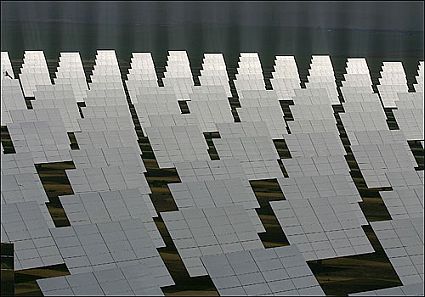
Solar energy has an extremely bright future as the risk of global warming and the finishing petroleum reserves will surely sway big giants to think more about the sun. A company in Spain is walking on the road that promises a green planet.
The company has started producing household electricity from the world’s first solar thermal plant named PS-10 near Seville. The technology has been named Concentrated Solar Thermal Energy, which means it uses the heat of the sun to convert water into steam that further runs steam turbine generators. The best feature of the project is that all this is done without even a single pound of CO2 emission.
The company has placed giant mirrors on the ground that tracks the sun all the long and reflects its light on a white tower. This light enables the PS-10 generate 11-megawatt power that is sufficient to power 6,000 homes. The plant has been in operation since March 2006 and is still being expanded.
Scientists associated with the project have stated that they are installing 300 additional reflectors that will increase the output of the plant to a massive 300 Megawatts by 2013. At that time the plant will be able to power about 180,000 houses that is same as the population of a city like Seville.

The reflectors make the tower so hot that all the dust that crosses the focal point of these reflectors on the tower is immediately vaporized. Researchers have also stated that the massive heat build up could easily melt all the metal in the tower if water that is being circulated is made to stop. This water is converted to steam and is then used to power the turbines located at the base of the tower.
The plant is located at a place that gets about 300 days of sunshine annually. This is another reason for the plant doing so well in Seville. The company is now setting up similar plants in Morocco and Algeria and is in negotiations to build more in California, Nevada and New Mexico.
When PS-10 is complete it will cost more than one and a half billion dollars to build. The plant proves to be economically viable because of the subsidies from the Spanish government and the European Union. But future advancements in solar technology will make plants PS-10 cheaper so that they can be implemented globally.
Via: NPR




